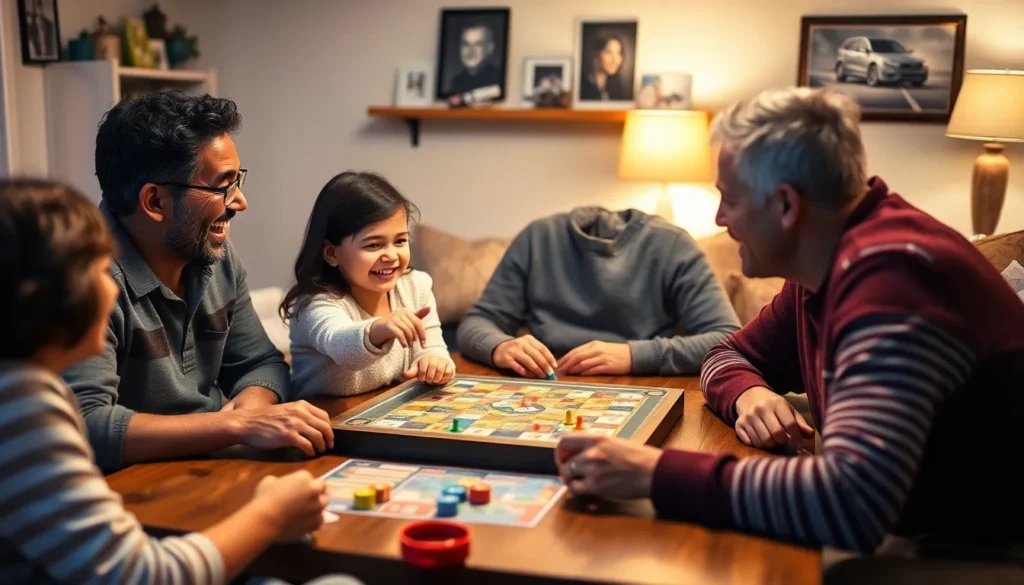Table of Contents
ToggleIn a world where screens dominate attention and family dinners often turn into solo snack sessions, family games are the secret sauce to rekindling connections. Imagine the laughter echoing through the house as everyone battles it out in a game of charades or strategizes their way to victory in a board game showdown. It’s not just about winning; it’s about creating memories that’ll be recounted at future gatherings, often with exaggerated flair.
What Are Family Games?
Family games encompass various activities designed to engage family members of all ages. These games serve as platforms for interaction, laughter, and communication. In a time when digital entertainment dominates, family games provide a necessary break from screens. Board games, card games, and outdoor games encourage friendly competition and cooperation.
Board games like Monopoly or Scrabble promote strategic thinking while providing opportunities for family bonding. Card games like Uno or Go Fish offer fast-paced fun that appeals to younger players. Outdoor games such as tag or capture the flag encourage physical activity and teamwork.
Hosting regular family game nights strengthens relationships. The excitement of engaging in games creates a warm atmosphere. This environment fosters open communication and deepens connections among family members. Engaging in these activities supports emotional well-being and builds shared memories.
Incorporating family games into routine life enhances cohesiveness. When families prioritize game time, they create lasting traditions. These shared experiences often become cherished stories shared during future gatherings.
Family games highlight the essence of togetherness. They shift focus from individual victories to collective enjoyment. This sense of belonging nurtures strong family dynamics. Ultimately, family games play a crucial role in creating joyful memories that resonate across time.
Benefits of Family Games


Family games offer numerous advantages that enhance family relationships and foster development. Engaging regularly creates invaluable experiences.
Encouraging Family Bonding
Family bonding becomes more meaningful through shared gameplay. Laughter and teamwork emerge during cooperative challenges. Kids absorb positive interactions with adults while playing games together. Classic board games foster connections, promoting conversations and building trust. Playful competition reinforces supportive relationships. Moreover, parents and children gain insights into each other’s personalities as they strategize and navigate obstacles together. Such interactions build a foundation of love and understanding that lasts beyond game night.
Developing Skills and Learning
Family games enhance cognitive and social skills. They stimulate critical thinking during strategic board games and improve problem-solving abilities. Kids learn to follow rules and develop patience while waiting for their turn. Card games enhance math skills and improve focus as players calculate scores and develop strategies. Outdoor games cultivate physical fitness and teamwork, teaching cooperation and sportsmanship. Families can incorporate educational games, allowing for enjoyable learning experiences. Engaging in diverse activities stimulates creativity and encourages lifelong learning among all family members.
Types of Family Games
Family games come in various formats, ensuring enjoyment for everyone. Each type offers unique experiences that foster togetherness.
Board Games
Board games like Monopoly and Scrabble invite strategic thinking and collaboration. Families gather around game boards, engaging in friendly competition. Players develop critical skills while laughing and strategizing through different scenarios. Games encourage communication and teamwork, making sessions lively and interactive. These evenings often transform into cherished traditions where stories are shared around the board.
Outdoor Games
Outdoor games encourage physical activity and teamwork. Options like tag and capture the flag engage families in active fun, promoting exercise and cooperation. Such games provide opportunities for creativity and spontaneity. Fresh air invigorates players, enhancing overall enjoyment. Team-based outdoor games also build trust and camaraderie as families compete in friendly contests.
Card Games
Card games offer quick, exciting gameplay suitable for all ages. Classics like Uno and Go Fish are perfect for family members of varying skill levels. Players develop strategic thinking, memory, and social skills while enjoying fast-paced rounds. The accessibility of card games makes them easy to set up, making them ideal for impromptu family gatherings. These games often lead to laughter and memorable moments shared among family members.
Video Games
Video games bring families together in a modern format. Cooperative multiplayer games foster teamwork as players work towards common objectives. Popular titles include Mario Kart and Minecraft, appealing to various age groups. Engaging with video games also enhances technology skills while providing a shared experience. The competitive nature of gaming inspires excitement and connection among family members.
Tips for Choosing Family Games
Choosing family games requires careful consideration of various factors. First, think about the age range of participants. Selecting games that cater to both younger and older family members fosters inclusivity and ensures everyone can participate.
Consider the number of players involved. Games accommodating larger groups often promote social interaction, while those designed for fewer players can enhance closer relationships. Look for games that encourage teamwork or collaboration to strengthen bonds among family members.
Evaluate the complexity of the games as well. Simple rules appeal to younger players and reduce frustration, fostering positive experiences. On the other hand, more strategic games can engage older participants and stimulate critical thinking.
Examine the length of playtime as well. Shorter games enable quick rounds and keep younger players engaged, while longer experiences can create deeper connections and strategic discussions. Mixing different duration games keeps things fresh and exciting during game nights.
Review the themes and interests of family members. Games featuring familiar topics such as favorite movies or hobbies can enhance engagement and spark conversations.
Lastly, check for reviews and recommendations. Insights from other families can provide valuable information about the game’s entertainment value and durability. By prioritizing these tips when selecting family games, families create meaningful experiences that linger long after the game night wraps up.







